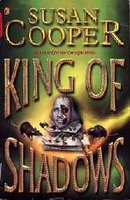Poetry Friday 19: King of Shadows - Susan Cooper

I've not done a combined Poetry Friday/book review before but it seemed particularly apt this week. Yesterday afternoon I finished reading Susan Cooper's fabulous time-slip tale King of Shadows. The title refers to these lines of Shakespeare's:
"This is thy negligence. Still thou mistak'st,
Or else commit'st thy knaveries wilfully."
"Believe me, king of shadows, I mistook."
- Oberon and Puck, A Midsummer Night's Dream, Act III Scene 3
The King of Shadows is by the bestselling author of The Dark is Rising Sequence
"'Greet Master Shakespeare, boy.'
It was as if he'd said, 'Say hello to God.'"
This is a daring and complex novel that is set against the background of the life of an unhappy boy who, after travelling unexpectedly through time, learns how to face his real-life troubles. Cooper's descriptive prose is combined with elegant dialogue thereby bringing her characters vividly to life. This story is beautifully crafted and Nat's situation is built up perfectly - his character's personal pain and how he copes with it, the culture shock that he experiences constantly in 1599, and the theatre and its people, then and now, are all described in detail. The book succeeds in bringing Shakespeare to life in more ways than one; it can certainly serve as an introduction to the Dream for someone who's never seen it performed (which I haven't - and I am now desperate to do), and it works as a living history of Shakespeare's time by showing London in concrete terms rather than dry statistics, and by introducing Nat to Shakespeare the person, and the other members of his company who first brought his plays to life.
But Nat is definitely a boy, not an historian, and he passes for his counterpart as well as he does only because English Nat was a sheltered educated softie by the standards of the day, on loan to a commercial theatre where he wasn't known personally. What American Nat knows about Shakespeare's time is as likely to get him into trouble as it is to help; how many people, for example, can remember which plays he'd already written by 1599 ? Or what the political troubles were at court at that time ? I can't recall - and I studied Shakespeare in both English and History for my degree.
So where does the poetry come in ? Well Nat breaks down as a result of his culture shock whilst talking with Shakespeare, and as a consequence, Will gives Nat a copy of a poem he has written:
Sonnet 116
Let me not to the marriage of true minds
Admit impediments. Love is not love
Which alters when it alteration finds,
Or bends with the remover to remove:
O no! it is an ever-fixed mark
That looks on tempests and is never shaken;
It is the star to every wandering bark,
Whose worth's unknown, although his height be taken.
Love's not Time's fool, though rosy lips and cheeks
Within his bending sickle's compass come:
Love alters not with his brief hours and weeks,
But bears it out even to the edge of doom.
If this be error and upon me proved,
I never writ, nor no man ever loved.
I won't explain to you the exact relevance of the poem to the story, because I don't want to spoil a moving and beautiful interaction between the two characters, but it fits perfectly into the plot. I do, however, want to share a couple of other quotes from the book:
Master Shakespeare [...] looked as if he had just come back from somewhere a long long way away and left his head behind him. (p. 80)
(A perfect description of a writer who has been interrupted in the middle of creating !)
Aunt Jen's [...] a high school English teacher, and she was the one who encouraged me to start acting [...]. She understood about the comfort you can get from a small separate world, whether it's a theatre, a basketball team, or the inside of a book. (p. 153)


6 comments:
I adore this book. I had Cooper sign my copy when she was at TLA this past April. I also asked her if my guess about the dedication was correct. I was right!
I'm trying to recall what the dedication said ! I did read it, but I've read 5 and a bit books since then, each with their own dedication. I always read dedications, and acknowledgements (not least because I occasionally appear in the latter !), and authors' notes - and any and all adverts in the back of books for other books !
When my workmate to whom I loaned this book returns it, I will check the dedication...
When you see it, think about what you might know about her personal life. I thought it was very sweet.
"For my actor"... Hmmm. Will have a think about that one, once I've eaten some breakfast !
I love this book as well! It's become pretty much a standard by which I measure both Shakespeare books and young adult in general (and especially where the two are combined).
You've written a lovely reflection on the story, and I've linked to you here: http://caramellunacy.blogspot.com/2007/04/king-of-shadows-susan-cooper.html
Thanks!
Thanks for the link. I adore this book more than any other Cooper has written.
Post a Comment